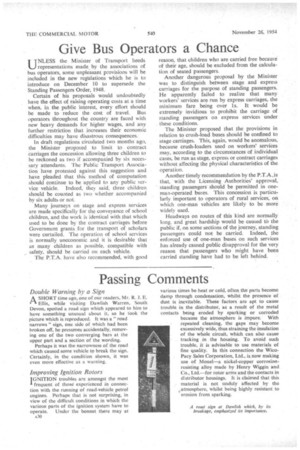Give Bus Operators a Chance
Page 32

If you've noticed an error in this article please click here to report it so we can fix it.
TNLESS the Minister of Transport heeds representations made, by the associations of bus operators, some unpleasant provisions will be included in the new regulations which he is to introduce on December 10 to supersede the Standing Passengers Order, 1948.
Certain of his proposals would undoubtedly have the effect of raising operating costs at a time when, in the public interest, every effort should be made to reduce the cost of travel. Bus operators throughout the country are faced with new heavy demands for higher wages, and any further restriction that increases their economic difficulties may have disastrous consequences.
In draft regulations circulated two months ago, the Minister proposed to limit to contract carriages the concession allowing three children to be reckoned as two if accompanied by six necessary attendants. The Public Transport Association have protested against this suggestion and have pleaded that this method of computation should continue to be applied to any public service vehicle. Indeed, they said, three children should be counted as two whether accompanied by six adults or not.
Many journeys on stage and express services are made specifically for the conveyance of school children, and the work is identical with that which used to be done by the contract carriages before Government grants for the transport of scholars were curtailed. The operation of school services is normally uneconomic and it is desirable that as many children as possible, compatible with safety. should be carried on each vehicle.
The P.T.A. have also recommended, with good reason, that children who are carried free because. of their age, should be excluded from the calculation of seated passengers.
Another dangerous proposal by the Minister was to distinguish between stage and express carriages for the purpose of standing passengers. He apparently failed to realize that many workers' services are run by express carriages, the minimum fare being over is. It would be extremely invidious to prohibit the carriage of standing passengers on express services under these conditions.
The Minister proposed that the provisions in relation to crush-load buses should be confined to stage carriages. This, again, would be anomalous, because crush-loaders used on workers' services may, according to the circumstances of individual cases, be run as stage, express or contract carriages without affecting the physical characteristics of the operation.
Another timely recommendation by the P.T.A..is that, with the Licensing Authorities' approval, standing passengers should be permitted in oneman-operated buses. This concessiori is particularly important to operators of rural services, on which one-man vehicles are likely to be more widely used.
Headways on routes of this kind are normally long, and great hardship would be caused to the public if, on some sections of the journey, standing passengers could not be carried. Indeed, the enforced use of one-man buses on such services has already caused public disapproval for the very reason that passengers who might have been carried standing have had to be left behind.




























































































